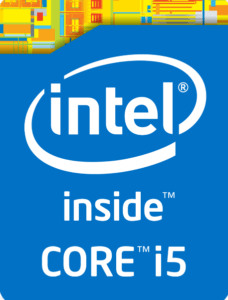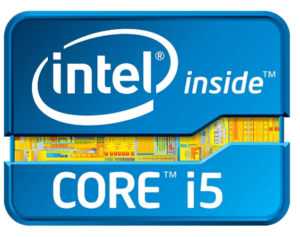Intel introduced 3 Skylake i5 processors in Q3 of 2015 and these three Intel i5 6200U, 6300U and 6360U occupied nearly 90% of all mid tier laptops in 2016. All these 3 processors are based on Skylake 14nm manufacturing.
Intel i5 CPU’s form the mid Tier of Intel’s performance band. i5 processors are work horses and almost match i7 in day to day performance. While they are not meant for graphical intensive software or games, they are more than enough for most of the population.
Intel i5 6360 U processor is exclusively used by Apple for its Macbook Pro laptops and other two processors are used by several manifacturers.
U processor is exclusively used by Apple for its Macbook Pro laptops and other two processors are used by several manifacturers.
Between these three processors most of the difference in clock speed and only minor. For all practical purposed i5 6200U and i5 6300U are identical except for 5% clock speed bump on i5 6300U processor.
i5 6300U supports Intel® Stable Image Platform Program (SIPP), Safe Code Execution and vPro mode in comparison to i5 6200U.
i5 6360U has 4MB smart cache vs 6200U and 6300U. Additionally uses Intel iris Graphics technology – Intel® Iris™ Graphics 540. 6200U and 6300U used intel Grpahics 520.
While 4MB smart cache and Iris 540 are expected to give a boost, it will be still a minor improvement.
For all practical purposes these CPU’s are similar and buyers should see RAM, Hard drive (SSD) etc to make a decision. With all other factors being equal go for the laptop which is cheaper.
| Intel® Core™ i5-6360U Processor (4M Cache, up to 3.10 GHz) | Intel® Core™ i5-6200U Processor (3M Cache, up to 2.80 GHz) | Intel® Core™ i5-6300U Processor (3M Cache, up to 3.00 GHz) | |
|---|---|---|---|
| Code Name | Skylake | Skylake | Skylake |
| Essentials | |||
| Processor Number | i5-6360U | i5-6200U | i5-6300U |
| Status | Launched | Launched | Launched |
| Launch Date | Q3'15 | Q3'15 | Q3'15 |
| Lithography | 14 nm | 14 nm | 14 nm |
| Recommended Customer Price | $304.00 | $281.00 | $281.00 |
| Performance | |||
| # of Cores | 2 | 2 | 2 |
| # of Threads | 4 | 4 | 4 |
| Processor Base Frequency | 2.00 GHz | 2.30 GHz | 2.40 GHz |
| Max Turbo Frequency | 3.10 GHz | 2.80 GHz | 3.00 GHz |
| Cache | 4 MB SmartCache | 3 MB SmartCache | 3 MB SmartCache |
| Bus Speed | 4 GT/s OPI | 4 GT/s OPI | 4 GT/s OPI |
| TDP | 15 W | 15 W | 15 W |
| Configurable TDP-down | 9.5 W | 7.5 W | 7.5 W |
| Configurable TDP-up Frequency | 2.40 GHz | 2.50 GHz | |
| Configurable TDP-up | 25 W | 25 W | |
| Configurable TDP-down Frequency | 800.00 MHz | 800.00 MHz | |
| Supplemental Information | |||
| Embedded Options Available | No | No | Yes |
| Conflict Free | Yes | Yes | Yes |
| Memory Specifications | |||
| Max Memory Size (dependent on memory type) | 32 GB | 32 GB | 32 GB |
| Memory Types | DDR4-2133, LPDDR3-1866, DDR3L-1600 | DDR4-2133, LPDDR3-1866, DDR3L-1600 | DDR4-2133, LPDDR3-1866, DDR3L-1600 |
| Max # of Memory Channels | 2 | 2 | 2 |
| Max Memory Bandwidth | 34.1 GB/s | 34.1 GB/s | 34.1 GB/s |
| ECC Memory Supported ‡ | No | No | No |
| Graphics Specifications | |||
| Processor Graphics ‡ | Intel® Iris™ Graphics 540 | Intel® HD Graphics 520 | Intel® HD Graphics 520 |
| Graphics Base Frequency | 300.00 MHz | 300.00 MHz | 300.00 MHz |
| Graphics Max Dynamic Frequency | 1.00 GHz | 1.00 GHz | 1.00 GHz |
| Graphics Video Max Memory | 32 GB | 32 GB | 32 GB |
| eDRAM | 64 MB | ||
| Graphics Output | eDP/DP/HDMI/DVI | eDP/DP/HDMI/DVI | eDP/DP/HDMI/DVI |
| 4K Support | Yes, at 60Hz | Yes, at 60Hz | Yes, at 60Hz |
| Max Resolution (HDMI 1.4)‡ | 4096x2304@24Hz | 4096x2304@24Hz | 4096x2304@24Hz |
| Max Resolution (DP)‡ | 4096x2304@60Hz | 4096x2304@60Hz | 4096x2304@60Hz |
| Max Resolution (eDP - Integrated Flat Panel)‡ | 4096x2304@60Hz | 4096x2304@60Hz | 4096x2304@60Hz |
| DirectX* Support | 12 | 12 | 12 |
| OpenGL* Support | 4.4 | 4.4 | 4.4 |
| Intel® Quick Sync Video | Yes | Yes | Yes |
| Intel® InTru™ 3D Technology | Yes | Yes | Yes |
| Intel® Clear Video HD Technology | Yes | Yes | Yes |
| Intel® Clear Video Technology | Yes | Yes | Yes |
| # of Displays Supported ‡ | 3 | 3 | 3 |
| Device ID | 0x1926 | 0x1916 | 0x1916 |
| Max Resolution (VGA)‡ | N/A | N/A | |
| Expansion Options | |||
| PCI Express Revision | 3.0 | 3.0 | 3.0 |
| PCI Express Configurations ‡ | 1x4, 2x2, 1x2+2x1 and 4x1 | 1x4, 2x2, 1x2+2x1 and 4x1 | 1x4, 2x2, 1x2+2x1 and 4x1 |
| Max # of PCI Express Lanes | 12 | 12 | 12 |
| Package Specifications | |||
| Sockets Supported | FCBGA1356 | FCBGA1356 | FCBGA1356 |
| Max CPU Configuration | 1 | 1 | 1 |
| TJUNCTION | 100°C | 100°C | 100°C |
| Package Size | 42x24x1.3 | 42mm X 24mm | 42mm X 24mm |
| Low Halogen Options Available | See MDDS | See MDDS | See MDDS |
| Advanced Technologies | |||
| Intel® Turbo Boost Technology | 2.0 | 2.0 | 2.0 |
| Intel® vPro Technology ‡ | Yes | No | Yes |
| Intel® Hyper-Threading Technology ‡ | Yes | Yes | Yes |
| Intel® Virtualization Technology (VT-x) ‡ | Yes | Yes | Yes |
| Intel® Virtualization Technology for Directed I/O (VT-d) ‡ | Yes | Yes | Yes |
| Intel® VT-x with Extended Page Tables (EPT) ‡ | Yes | Yes | Yes |
| Intel® TSX-NI | Yes | No | Yes |
| Intel® 64 ‡ | Yes | Yes | Yes |
| Instruction Set | 64-bit | 64-bit | 64-bit |
| Instruction Set Extensions | SSE4.1/4.2, AVX 2.0 | SSE4.1/4.2, AVX 2.0 | SSE4.1/4.2, AVX 2.0 |
| Idle States | Yes | Yes | Yes |
| Enhanced Intel SpeedStep® Technology | Yes | Yes | Yes |
| Thermal Monitoring Technologies | Yes | Yes | Yes |
| Intel® Flex Memory Access | Yes | Yes | Yes |
| Intel® Identity Protection Technology ‡ | Yes | Yes | Yes |
| Intel® Stable Image Platform Program (SIPP) | Yes | No | Yes |
| Intel® Smart Response Technology | Yes | Yes | Yes |
| Intel® My WiFi Technology | Yes | Yes | Yes |
| Intel® Data Protection Technology | |||
| Intel® AES New Instructions | Yes | Yes | Yes |
| Secure Key | Yes | Yes | Yes |
| Intel® Software Guard Extensions (Intel® SGX) | Yes | Yes | Yes |
| Intel® Memory Protection Extensions (Intel® MPX) | Yes | Yes | Yes |
| Intel® Platform Protection Technology | |||
| Trusted Execution Technology ‡ | Yes | No | Yes |
| Execute Disable Bit ‡ | Yes | Yes | Yes |
| OS Guard | Yes | Yes | Yes |

